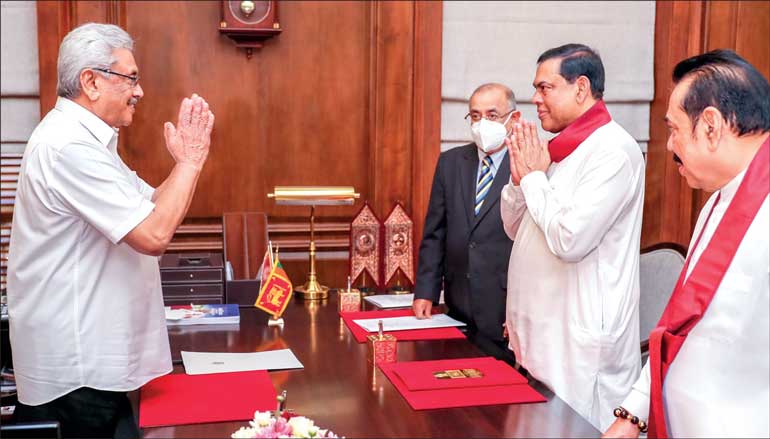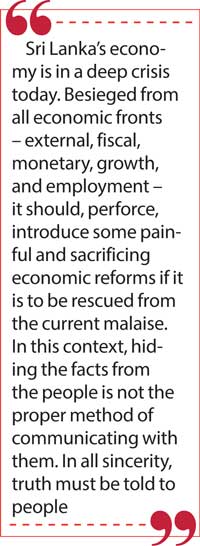Thursday Feb 19, 2026
Thursday Feb 19, 2026
Monday, 12 July 2021 00:07 - - {{hitsCtrl.values.hits}}

We hope that he will not hesitate to choose pragmatism in preference to dogmatic idealism which some of the top policymakers of the Government have been faithfully coaxing him to adopt
 Basil to the rescue of the ailing economy
Basil to the rescue of the ailing economy
The new Finance Minister Basil Rajapaksa, known in political circles by his first name Basil, is reported to have made an especially important confession on assuming duties last week.
He is said to have pronounced: “Our priority is to serve the people. We have identified all the key priorities and requirements of the general public. However, at times we will have to take certain unpopular decisions, just like how a father would for the betterment of his children and family. But these out-of-favour decisions are taken with so much honesty and consideration for the betterment of the entire nation. Therefore, I urge you all to support our efforts in these trying times” (available at: https://www.ft.lk/top-story/Basil-boost-for-Govt/26-720237).
The habit of all the previous finance ministers has been to mollycoddle the people with sugar-coated words when they assumed that important job. By the time they assumed office, the respective economies have been in the depth of the depths, but finance ministers had promised sun and moon to people. But within days, all of them had to swallow their bold utterances and were compelled to pass economic burdens on to people when they encountered the empty Treasuries they had inherited.
Basil has deviated from this practice and been frank about the nature of economic reforms he was planning to introduce. That is a good sign, and it is good for Sri Lanka’s long-term economic growth.
Deep economic crisis
Sri Lanka’s economy is in a deep crisis today. Besieged from all economic fronts – external, fiscal, monetary, growth, and employment – it should, perforce, introduce some painful and sacrificing economic reforms if it is to be rescued from the current malaise. In this context, hiding the facts from the people is not the proper method of communicating with them. In all sincerity, truth must be told to people.
It reminds me of how Sirimavo Bandaranaike, the then Prime Minister, came on the Sri Lanka Broadcasting Corporation in 1973 and warned the people that the country was sitting on a volcano, and it could erupt at any time. This was a time when the country had faced a severe food crisis, foreign exchange crisis, fiscal crisis, and a political crisis. It forewarned people that some painful measures were to be introduced by the Government to take the economy out of the crisis. Of course, her modus operandi for rescuing the economy was not the best for the country. But she was truthful and did not want to hide anything from the people.
Failure to keep people informed of the gravity of the crisis
The problem with the Gotabaya Rajapaksa administration from day one of assuming office was that it had hidden the true facts from the people. Its top leaders had been pronouncing ad infinitum that they possessed a magic wand to deliver prosperity to people whereas the reality was completely different. Hence, when unpopular policies like the fuel price increase were introduced, there were country-wide protest campaigns against them by affected people.
Basil has, therefore, started his job with a clear warning to people; he had said that the country was going through the most difficult period in its history, and solicited everyone’s cooperation to come out of it. What it means is that they should not expect free handouts from the Government.
No free lunches in the path to prosperity
The path to prosperity is painful, rugged, and difficult to tread. Taking an easy line, the Gotabaya Rajapaksa administration had sought in the past 18 months to deliver prosperity by getting the Central Bank and commercial banks to finance its activities. From January 2020 to May 2021, it had borrowed from the banking system some staggering Rs. 2.6 trillion, a record by any standard. This is a practice that should not be continued. That is because prosperity comes, as Singapore’s first Finance Minister Goh Keng Swee once said, not from the central bank printed money but through the hard work of people.
He had further said that if people wanted better government services, they should be prepared to pay for them. They should realise, he had emphasised, that there was no ‘free-lunch’ as such. All lunches, though they appear to be free, had to be paid for by people either through high taxes or through inflation. Both are inequitable and more painful than the hard work because they unfairly fall on low-income people.
An empty Treasury
What is the type of the Treasury which Basil has inherited? It is empty to the core. That was partly due to a folly of the Gotabaya Rajapaksa administration when it assumed office in November 2019. It offered an incredibly attractive tax concession package to value-added tax or VAT payers and income taxpayers. It cost the Treasury some staggering Rs. 519 billion by way of lost tax revenue in 2020 compared to the level that had been attained in 2019. Given the dull economic performance, the year 2021 too is expected to deliver similar results.
Disregarding the warnings against tax concessions
When this was announced in late 2019, I warned the Gotabaya Rajapaksa administration to abandon it since it was going to cost his Government dearly in an article in this series (available at: https://www.ft.lk/columns/Tax-cuts-Control-the-damage-before-the-unconventional-stimulus-backfires/4-691207). The rationale of the tax cuts, according to the Government spokespersons, was to lower tax rates and rope in more taxpayers to the tax net. Hence, in the long run, it was argued, that the tax revenue will increase compensating for the losses it may have experienced immediately.
But I warned the Gotabaya Rajapaksa administration as follows: “This logic is indeed in line with what is known as the Laffer Curve, named after the American economist Arthur Laffer. According to Laffer, there is an optimal income tax rate up to which the revenue will increase and if the rate shoots over that optimal rate, revenue will begin to fall. Hence, when a country is in the revenue falling region, the reduction of the income tax rate would certainly increase revenue instead of reducing it.
“Empirical studies have shown that this optimal income tax rate stands at around 70% for most of the countries. Sri Lanka’s marginal income tax rate is just 24% and therefore, it has not yet reached the level of taxation that prompts an increase in revenue if the rate is cut. Hence, it is not the Laffer Curve which may have prompted Sri Lankan authorities to cut tax rates but some other consideration. That is to provide an additional income to the hands of the taxpayers, catch more liable people into the tax net and increase the tax revenue by getting more people to pay taxes.
“This last goal had been expressly mentioned in the election manifesto. According to press reports, the tax cut is intended to address both the individual taxpayers and the corporate taxpayers.”
Continuation of the costly tax concessions
In the context of the deadly external shock delivered to the economy by the COVID-19 pandemic, I suggested in a subsequent article in this series that the costly tax reforms should be postponed till the economy would return to normalcy again (available at: https://www.ft.lk/columns/Constrained-fiscal-space-for-post-COVID-19-reconstruction-Consider-postponing-costly-tax-reforms/4-700327). In this article, I argued, “These types of tax reforms should be tried under normal situations. The present COVID-19 environment is not the ideal situation to do so. It has handicapped the Government by restricting its freedom to respond to the rising demands made of it by affected individuals and businesses. If the revenue does not flow into the Consolidated Fund, there is no way for the Minister of Finance to withdraw funds from it by issuing a warrant under the Constitution.
“Even after the expected approval of a formal budget by the new Parliament, the Government will continue to suffer from this handicap due to its low revenue base. It will not be able to meet its financial obligations unless it borrows heavily from the local and foreign markets. Both would worsen the country’s debt situation pushing it further down to an inescapable debt trap. This has to be avoided at all costs. Given these circumstances, it will be prudent for the Government to postpone its generous tax reforms until the country returns to normalcy.”
Money printing to finance Government expenditure programs
When the revenue was falling, the Gotabaya Rajapaksa administration had resorted to borrowing from the banking sector to finance its increased expenditure programs. This was in accord with the adherence to a policy prescription propounded by a breakaway group of economists from the mainstream economists called ‘Modern Monetary Theorists’. This was an ideological dogma to which the top policymakers in the administration had subscribed without regard for its applicability to a country like Sri Lanka which does not issue a reserve currency like USA or EU.
It was equivalent to imposing an inflation tax on the people to have their resources transferred to the Government in the absence of a viable revenue mobilising scheme. But it would backfire by creating inflation, on the one hand, and putting pressure for the exchange rate to depreciate, on the other.
In an article in this series (available at: https://www.ft.lk/opinion/Following-MMT-Should-Sri-Lanka-rely-on-inflation-tax-to-generate-income-for-cash-strapped-Govt/14-713565 ), I warned the Government of this as follows: “Governments’ use of inflation as a tax to force-mobilise resources for funding Government projects, has been equated to the fate of the villager who sought to get a demon to work for him. In the short run, a government could forget about all its fiscal problems and enjoy the temporary solace provided by it.
“But in the long run, when inflation becomes uncontrollable, it will have to sacrifice all its temporary gains. When an initially mild inflation degenerates into an uncontrollable hyper-inflation later, it has been termed as a mass killer. It would destroy the financial infrastructure and, through it, the entire social and economic infrastructure. Rebuilding a nation after this massive destruction would be a very painful and tedious challenge for everyone.”
 Seeking to resolve the issue through palliatives
Seeking to resolve the issue through palliatives
Now Basil as the Minister of Finance should face the bitter truth. Sri Lanka’s foreign reserves have declined to a critically low level and is on a continuous declining path. Consequently, the rupee is under continuous pressure for depreciation. The Central Bank has fooled itself by announcing an exchange rate at Rs. 202 to US dollar which it claims the interbank Telegraphic transfer or TT rate. But no dollars are available in the market at this rate and in the curb market, the rate has fallen to Rs. 236 per US dollar marking an unwarranted margin of some 17%.
Sri Lanka’s Central Bank Governor had tried to build confidence in the country’s investors by announcing a series of palliatives to overcome the immediate foreign exchange crisis. They included some SWAP arrangements with China, India, and Bangladesh and a free Special Drawing Rights or SDR allocation of $ 800 million from the International Monetary Fund or IMF. But this announcement could not assure the investors who have now been driven to a panic mode.
The yield rate of the International Sovereign Bond or ISB maturing in two weeks’ time on 27 July has jumped to 48% when its coupon rate amounted to 6.25%. This yield rate signifies a market price of $ 98 per 100-dollar bond. Usually, when a bond reaches its maturity, its market price begins to converge with the face value. But in this case, the market has not responded positively to the assurances given by the Central Bank. With these high yield rates, Sri Lanka is now unable to secure funds from the international sovereign bond markets. It cannot secure funds even by issuing its Sri Lanka Development Bonds or SLDBs in the local markets despite the high interest rates paid.
Encouraging private businesses to borrow abroad and gamble on the Government securities market
The Central Bank has made another folly last week to arrest this situation. It has permitted the private businesses to borrow abroad, use up to 50% for investment in ISBs in the secondary market, and use the balance to buy SLDBs for which there is no market appetite from their conventional investors. The Bank in its wisdom has tried to solve the problems of the Government. But it has created a bigger problem elsewhere by increasing the country’s foreign indebtedness, this time by the private sector.
It is also not in line with prudential economic management because instead of borrowing abroad for investing in real economic activities, it has encouraged private businesses to borrow and gamble on the government securities market. Furthermore, it also does not stand to logical reasoning for private businesses to borrow abroad and invest in securities which have been downgraded to CCC level by all the rating agencies. Thus, if the Government, for some reason, defaults or fails to recycle its foreign debt securities, these companies, and consequently, the national economy, are exposed to high risks.
No choice but to seek IMF support
As I have argued in the article in this series last week (available at: https://www.ft.lk/opinion/Forex-crisis-plea-for-calmness-in-national-interest-and-need-for-getting-IMF-driven-bailout/14-719992), the only viable option available for Sri Lanka is to secure a funding line from IMF. But the top policy leaders of the Government have been making the bold statement that the Government will not seek IMF support to come out of the crisis facing the country today. This is adherence to the dogmatic ideal of being anti-IMF, anti-economic reforms, and anti-trade.
Basil has no luxury to entertain these ideals. He should be pragmatic, and that pragmatism requires him to seek support from IMF, go into economic reforms, abandon the anti-trade policy, and trust markets. These are unpopular measures but needed to be introduced if the country is to move back to its long-term economic growth path.
We hope that he will not hesitate to choose pragmatism in preference to dogmatic idealism which some of the top policymakers of the Government have been faithfully coaxing him to adopt.
(The writer, a former Deputy Governor of the Central Bank of Sri Lanka, can be reached at [email protected].)